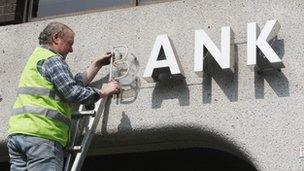Ireland officially back in recession says new report
- Published

Figures show the Republic of Ireland is officially back in recession
The Republic of Ireland is officially back in recession, new figures have revealed.
According to a report on the overall economy, measured under gross domestic product and including the multinational sector, the country saw a fall in the value of business and services at the end of last year and early this year.
The homegrown end of the economy, gross national product, performed better.
There was 2.9% growth there in the first quarter of the year.
Revised Central Statistics Office figures state that the country is back in recession for the first time since 2009.
The widely accepted definition of a recession is two consecutive quarters of negative economic growth.
Preliminary estimates show that gross domestic product contracted by 0.6% in the first three months of the year.
This was as a result of falling exports and weakening consumer spending.
The figures also show that personal expenditure dropped by 3% on a seasonally adjusted basis between the last quarter of 2012 and the first quarter of 2013.
Net exports also declined by more than one billion euros over the three-month period.
Official job market figures reveal there was an increase of 20,500 people in work between early 2012 and early 2013.
Irish Deputy Prime Minister Eamon Gilmore said the news on employment was an improvement on the experience of four years ago.
"We are seeing some recovery but it is still fragile," he said.
Irish Exporters' Association chief executive John Whelan said the first three months of 2013 had been "disastrous" for manufacturing and agri-food exports, which fell by 9% during that time.
He said services exports had continued to grow and were up by 3%, but that economic conditions would remain difficult this year.
"The worry at this particular juncture - (with) all our information coming from our main markets across Europe and in the UK, is that we're not going to have a rapid bounce back in the second half of this year," he told Irish state broadcaster RTE.
"So our manufacturing and agri-food guys are going to have an extremely tough second half of the year."
The latest figures now rank the Republic of Ireland's economy in a similar bracket to Spain and Portugal as far as eurozone countries are concerned.
A spokesman for Ireland's Department of Finance acknowledged the figures were disappointing and blamed a weak global economy for low demand for Irish exports.
He noted that the pharmaceutical sector was being affected by what it called the "patent cliff" for medicines and that other factors, such as a new registration system for car sales, were playing a part.
- Published2 February 2012
- Published12 July 2012
- Published5 June 2012
- Published12 July 2011